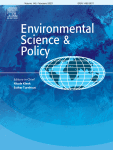Externe Publikationen

Governance towards coordination for water resources management: the effect of governance modes
Lukat Evelyn / Andrea Lenschow / Ines Dombrowsky / Franziska Meergans / Nora Schütze / Ulf Stein / Claudia Pahl-WostlExterne Publikationen (2023)
in: Environmental Science & Policy 141, 50-60
DOI: https://doi.org/10.1016/j.envsci.2022.12.016
Integrated Water Resource Management relies intensive coordination, vertically across different levels of government and horizontally across policy sectors, as many decisions affecting water resources are taken outside the water sector (e.g., in agriculture, industry). Coordination problems across levels and sectors may arise due to incompatibilities of governance modes – coordinative mechanisms ranging from hierarchy, network, to market mode – employed in the often fragmented water policy domain. This paper contributes to the discussion departing from the overarching hypothesis that synergistic interplay of governance modes rather than the dominance of a single mode supports coordination. This hypothesis is rooted in the assumption that given the plurality of state and non-state actors in water governance, who are entangled in formal and informal relationships, neither the dominance of hierarchical control, market competition, nor collaboration in networks alone is capable to ensure coordination results as different modes are appropriate for different relationships within the sector. Coordination processes and results, therefore depend on the synergistic interplay between the governance modes employed. The paper presents case studies from Germany, Mongolia, South Africa, and Spain, which face different cross-sector coordination challenges. Our findings suggest that despite policy reforms for integrated water and environmental governance, hierarchy prevails in formal provisions and practices to differing degrees. We find evidence that synergistic interplay between governance modes supports horizontal coordination, which is necessary for solving nexus governance challenges. However, synergistic interplay is not sufficient to translate coordination practices to coordination outcomes. Factors such as leadership and conflicts powerfully influence the translation as well.
InformationKontakt
Cornelia Hornschild
Koordinatorin Publikationen
E-Mail Cornelia.Hornschild@idos-research.de
Telefon +49 (0)228 94927-135
Fax +49 (0)228 94927-130
Alexandra Fante
Bibliothekarin/Open Access-Koordinatorin
E-Mail Alexandra.Fante@idos-research.de
Telefon +49 (0)228 94927-321
Fax +49 (0)228 94927-130



